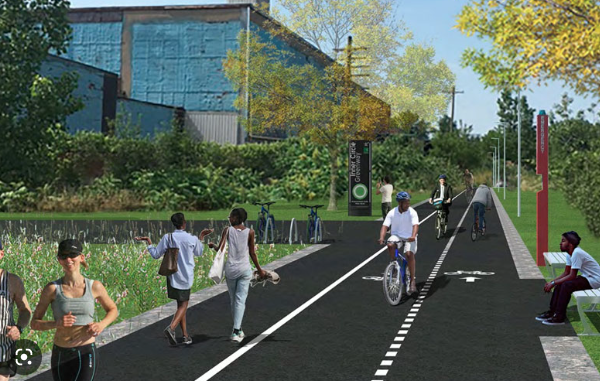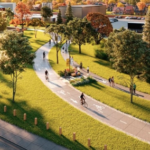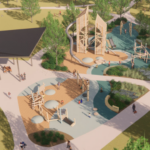
- Kim Kisner
- Community
- 02/21/2023
The Goal: To be a Place for Community and Businesses to Grow and Thrive

The Joe Louis Greenway is a 27.5-mile pathway that will connect 23 neighborhoods and the cities of Detroit, Hamtramck, Highland Park, and Dearborn to each other and to the Detroit riverfront, Dequindre Cut, Belle Isle, pedestrian/cyclist crossings at the Ambassador and Gordie Howe International bridges, and other trails.
Upon completion, more than 40,000 residents will be able to walk to the greenway within 10 minutes.
The project is based on a Framework Plan funded by the Ralph C. Wilson, Jr. Foundation and shaped by voices from the community. The General Services Department team led 14 community meetings and attended more than 40 other events and meetings to gather feedback from residents to create the plan. The project is being recognized for its focus on inclusion, and for bringing a wide range of voices to the table while fostering citizen advocacy and activism. In October, The American Planning Association awarded the 2022 Advancing Diversity and Social Change in Honor of Paul Davidoff Award to the project.
The greenway has received significant state and federal funding. And earlier this month, the city of Detroit, Detroit Riverfront Conservancy, and Joe Louis Greenway Partnership announced the Unified Greenway Partnership, an alliance that will raise funds to complete the Detroit Riverfront from Belle Isle to the Ambassador Bridge, build the Joe Louis Greenway around the city, and endow both projects for long-term management.
SBN Detroit spoke to Brad Dick, COO for the City of Detroit, about inclusion, the use of space for social justice, and the greenway’s potential impact on area businesses and new business development.

Q: There is a significant amount of funding from different entities coming in for the greenway. What are your thoughts on the ‘investment in urban spaces’ and the implications this has on small businesses in the area, as well as the opportunities this represents for new business development?
A: The Joe Louis Greenway (JLG) is a historic investment across multiple cities and neighborhoods, including Detroit, Highland Park, Hamtramck, and Dearborn. The greenway will transform a blighted, abandoned rail corridor into a beautiful park running through Detroiters’ backyards. To date, the project has removed more than 68,000 cubic yards of debris (which could fill 22 Olympic-sized swimming pools) and nearly 23,000 old, illegally dumped tires from the area, and is investing in permanent infrastructure and beautification that enhances the quality of life and provides equitable access to public resources.
Investment in urban spaces brings communities together and provides economic opportunities for local entrepreneurs and businesses to grow and expand, creating jobs, and economic growth, as well as wealth-building opportunities for our residents along the greenway itself and in adjacent communities.
Our goal is to make this greenway a destination, which will attract people from all over the region, creating a strong market for existing and new small businesses. The greenway will also provide safe routes, and comfortable connections for both employees and business owners to get to work.
Q: How has this project established itself as a model for neighborhood stabilization and for addressing community-based issues as it pertains to social justice?
A: Residents have been at the core of the planning process for the Joe Louis Greenway, and hundreds of Detroiters attended community meetings held as part of the Joe Louis Greenway Framework Plan. The Joe Louis Greenway Citizen Advisory Council helped guide the planning process and continues to advocate for the Greenway. The group of dedicated individuals that guided the Framework Plan represented all seven of Detroit’s Council Districts, as well as residents of Highland Park, Dearborn, and Hamtramck, which also touch the Greenway.
Joe Louis worked tirelessly to advocate for the rights of Black Americans and to promote social justice in the United States. The Greenway is more than a tribute to his legacy. It celebrates Joe Louis as a role model and as someone whose values can guide this project and the Detroiters it brings together.
Q: What are the equitable economic development benefits of this project?
A: The JLG is about access – including access to opportunity. Intentional planning, outreach, and action will create economic opportunity for residents in every neighborhood that the Joe Louis Greenway touches. The economic development benefits will include blight reduction and beautification, housing stabilization, preservation of affordable housing, job training, and career opportunities, existing and new small business support, and light industrial development opportunities.

The Neighborhood Planning Study, led by Planning and Development Department, will continue the dialogue with the community and focus on opportunities for community and economic development along the Greenway.
Q: How will the Neighborhood Planning Study support social justice as well as economic and business/job opportunities?
A: As Mayor Mike Duggan has said, the impact of this greenway will extend far beyond the boundaries of the path itself, creating opportunities for Detroiters to thrive. When complete, the greenway will generate jobs and affordable housing opportunities, and ease mobility barriers that have challenged Detroiters for decades. It also will help Detroiters build generational wealth for homeowners by increasing their property values through the beautification and economic investment that the greenway will bring to their neighborhood.
Throughout the planning process, residents voiced a need to heal long-standing urban trauma, particularly concerning urban renewal that ultimately displaced Black residents who called those neighborhoods home and whose businesses were torn down. By acknowledging that past trauma, promoting dialogue, and providing new opportunities for healing, the greenway can be a place where Detroiters advance a better understanding of racial justice.
Q: How is the greenway helping to build a more sustainable Detroit?
A: The design of the greenway incorporates stormwater management to reduce flooding impacts, native meadow plantings to provide bird habitat, and trees throughout to provide shade and help with air quality. Sustainability, however, goes much further than just the environment. This project will impact many facets of sustainability, including public health, economic development, neighborhood stabilization, park access, and connectivity. The Framework Plan ensures that the Joe Louis Greenway will transform the infrastructure that previously divided neighborhoods into one that unites community and reconnects natural systems, catalyzes economic redevelopment, and supports a resilient social network.
The Joe Louis Greenway will become much more than another place to walk, bike, and roll in Detroit. It will become an exceptional public space and connect communities and experiences – from quiet morning walks to lively evening bike club rolls with lights and music. The community-led framework plan helps ensure this happens in alignment with the vision of local communities along the greenway.
Be sure to subscribe to our newsletter for regular updates on sustainable business practices in and around Detroit.
Kim Kisner
- All
- Business
- Community
- Education
- Events

Unique Monique Scented Candles, a Detroit-based business founded by Monique Bounds., aims to produce candles and household products with clean ingredients and local supply chains. What began as a personal hobby during college has evolved into a full-time venture producing coconut oil and soy-based candles made with essential oils and locally sourced materials. SBN Detroit interviewed Bounds about launching a sustainable product line, sourcing challenges in Michigan, and...

Eastern Market Partnership, in collaboration with the City of Detroit’s Office of Sustainability Urban Agriculture Division, has announced $240,000 in grant funding to support Detroit-based farmers and farmer collectives. The grants will advance food access, climate education, sustainable land use, and economic opportunity, with priority given to Black- and Indigenous-led farms, youth-led initiatives, and projects rooted in historically disinvested neighborhoods. The recipients – ranging from cooperatives and community...

Citizen Robotics is a Detroit-based nonprofit that advances the use of robotics and digital manufacturing in residential construction, focusing on improving productivity, sustainability, and long-term affordability. Best known for its early work in 3D-printed housing, it explores how alternative construction methods and new financial models can reduce material waste, lower lifetime operating costs, and enhance the resilience of homes. SBN Detroit interviewed Tom Woodman, founder and president of...







